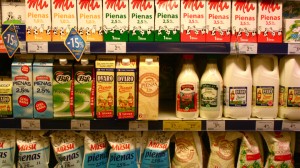
The dairy sections of Russian supermarkets may start looking more like this now that the ban on Lithuanian milk has been lifted. Photo by Nathan Greenhalgh.
MOSCOW — Russia agreed to resume the importation of Lithuanian dairy products on Friday, allowing products from 11 specific companies to be sold within the Russian Federation.
On Oct. 16 the director of the State Food and Veterinary Service of Lithuania Kazimieras Lukauskas met the head of Russia’s food inspection agency Rosselkhoznadzor, Sergey Dankvert in Moscow to discuss the delivery of Lithuanian dairy production in Russia.
At that meeting Lukauskas gave Dankvert additional guarantees on the conformity to requirements of production of dairy products intended for the export to Russia.
In September the veterinary inspectors of Russia visited Lithuania to check milk processing enterprises and discovered tetracycline, an antibiotic banned in Russia but allowed in the European Union, in the milk.
“One Lithuanian veterinary inspector had been closing his eyes to the discrepancy of milk to the standards and presence of antibiotics in it for long time. As we know, he has already been dismissed and has been punished,” Alexey Alekseenko, Rosselkhoznadzor press secretary, told Baltic Reports.
The Russians are not releasing the name of the inspector. A Rosselkhoznadzor representative requested that all Lithuanian dairy farms, which number about 10,000, implement a number of food safety measures. After an interdiction of import of production to Russia, the new regulations have been accepted in Lithuania and in turn Lithuanian Minister of Agriculture Kazys Starkevičius has visited Russian dairy product inspection laboratories and changed the inspection methods conducted at counterpart laboratories in Lithuania.
Lukauskas said he was satisfied with the agreement with the Russians, and has signed a memorandum of mutual understanding between the two country’s food safety regulators. Dairy products from Rokiškio sūris’ Utenos pienas brand, Pieno žvaigždės’ Panevėžio pienas, Kauno pienas and Pasvalio sūrinė brands, Vikeda, Vilkyškių pieninė, Šilutės Rambynas, Klaipėdos pienas, Žemaitijos pienas, Kelmės pieninė and Lukšių pieninė can now be sold in Russia.
“This is a big achievement in the strengthening of equal rights and mutually advantageous cooperation in the spheres of protection of the quality of the foodstuffs and the rights of consumers,” Lukauskas said. According to the memorandum, Lithuania and Russia will cooperate in carrying out of laboratory research.
Despite that the resumption of imports, Russian regulators say they will be closely inspecting Lithuanian dairy products and in December will reconsider reimposing the ban depending on the inspectors’ findings.
As for Lithuanian cheeses previously designated for shipment to Russia that contain the antibiotic, Alekseenko told Baltic Reports, “Lithuanian exports to Russia are not the biggest part of production. The basic stream goes to Europe in which presence of these antibiotics in production is admissible. Let it be sent to Europe.”
Dairy products aren’t the only food item from Lithuanian that has drawn the ire of Russian food safety regulators. Beef from Lithuania, as well as Argentina, Brazil and Germany will be restricted.












